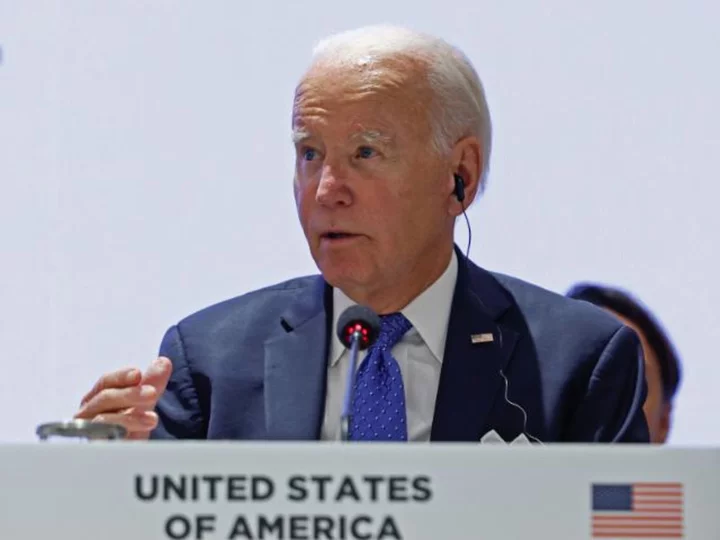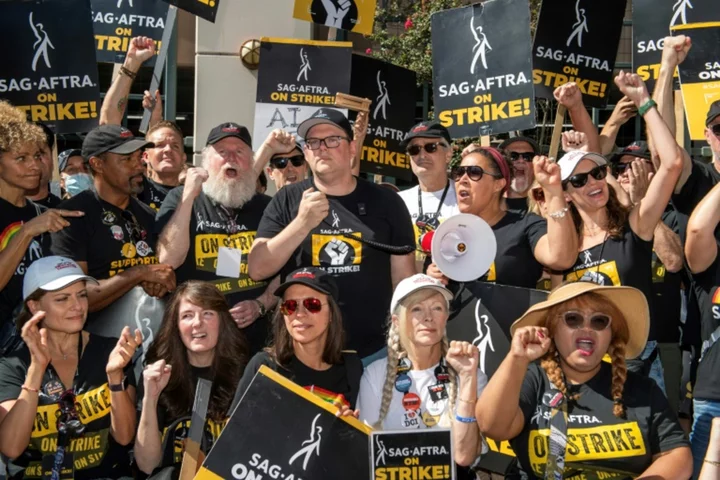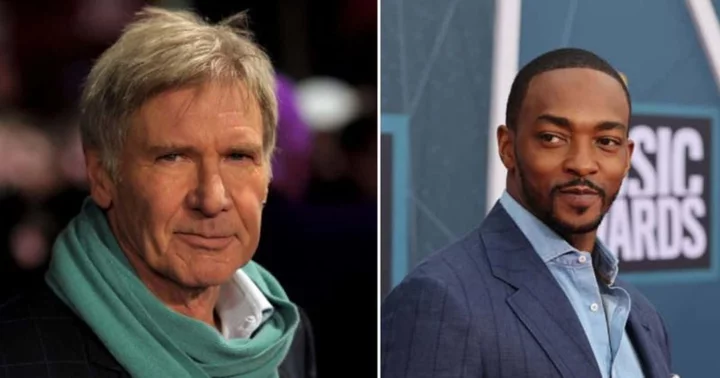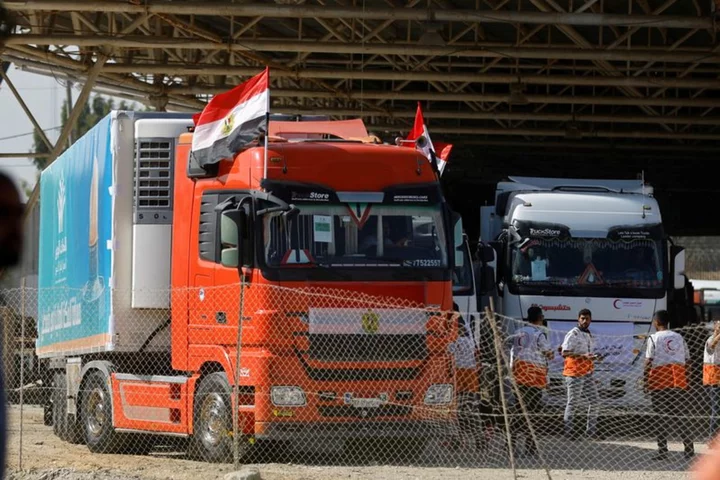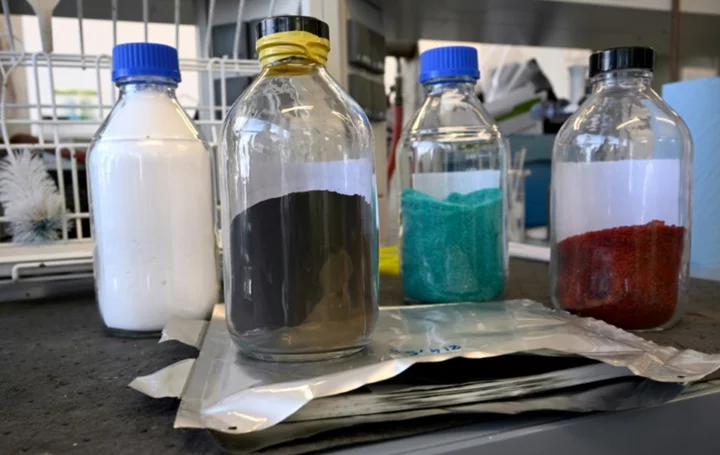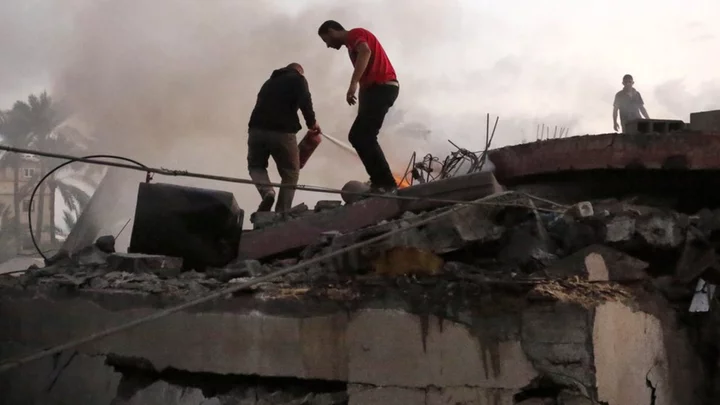President Joe Biden is nearing the end of a whirlwind trip to India and Vietnam for a series of high-profile meetings aimed at countering China's influence in the developing world.
At the G20 in New Delhi and again in Hanoi, Biden used his swing through Asia to make the case that the US is a more reliable and trustworthy partner than Beijing, though he emphasized that he did not want a new Cold War with the Chinese.
"I don't want to contain China, I just want to make sure we have a relationship with China that is on the up-and-up squared away, and everyone knows what it's all about," Biden said. "We have an opportunity to strengthen alliances around the world to maintain stability. That's what this trip is all about, having India cooperate much more with United States, be closer to the United States, Vietnam being closer with the United States. It's not about containing China. It's about having a stable base -- a stable base in Indo-Pacific."
In speaking to General Secretary Nguyễn Phú Trọng of the Communist Party of Vietnam on Sunday, Biden underscored this point.
"I think we have an enormous opportunity," he said, adding: "Vietnam and the United States are critical partners at what I would argue is a very critical time. I'm not saying that to be polite. I'm saying it because I mean it from the bottom of my heart."
He referenced supply chains and climate change and hailed "aspirations for a future of greater peace, greater security and greater prosperity."
"I'm convinced we can achieve it," he said, adding: "This can be the beginning of even a greater era of cooperation."
But despite Biden's hopes, there were still signs of the fractures that are coursing through current geopolitics, both at the G20 summit and in Hanoi. Here are five takeaways from the president's trip to New Delhi and Hanoi.
US praises G-20 statement on Ukraine, even if it's softer than hoped
Leaders managed to agree on a joint statement laying out shared views on climate change and economic development but showed the fractures within the group by stopping short of explicitly condemning Russia's invasion of Ukraine.
Diplomats had been working furiously to draft a final joint statement in the lead-up to the summit but hit snags on language to describe the Ukraine war. Officials said they worked through 300 hours of meetings and went through 15 drafts to arrive at an eventual consensus.
The eventual compromise statement amounted to a coup for the summit's host, Indian Prime Minister Narendra Modi, but still reflected a position far softer than those the United States and its Western allies have adopted individually.
"All states must refrain from the threat or use of force to seek territorial acquisition," the declaration read, without explicitly singling out Russia for its invasion. The document also stated opposition to the use of nuclear weapons and highlighted the economic effects of the war.
In a reflection of the deep fractures among the G20 nations, the statement acknowledged "there were different views and assessments of the situation."
The declaration earned the praise of the United States. National security adviser Jake Sullivan called the statement a "significant milestone for India's chairmanship and a vote of confidence that the G20 can come together to address a pressing range of issues."
"The G20 statement includes a set of consequential paragraphs on the war in Ukraine. And from our perspective, it does a very good job of standing up for the principle that states cannot use force to seek territorial acquisition," Sullivan said.
Still, the language differed from last year's G20 declaration, which stated "most members strongly condemned the war in Ukraine."
Russia, as a member of the G20, would have to agree on any consensus statement on Ukraine. Russia and China had resisted stronger language in a final statement, making any kind of agreement difficult. No G20 summit has concluded without a joint declaration of some type.
Ukraine's Foreign Ministry spokesperson Oleg Nikolenko criticized the declaration.
"Ukraine is grateful to its partners who tried to include strong wording in the text," he wrote on Facebook. "At the same time, the G20 has nothing to be proud of in the part about Russia's aggression against Ukraine. Obviously, the participation of the Ukrainian side would have allowed the participants to better understand the situation. The principle of 'nothing about Ukraine without Ukraine' remains as key as ever."
Biden offers an alternative to China's Belt and Road
Biden hoped to use new announcements on new infrastructure and investments as demonstration of US commitment to the developing world, and a better option for partnership than China. He announced the launch of a new economic corridor that will connect India, the Middle East and Europe on Saturday.
The plans could potentially transform global trade and directly challenge China's own sprawling overseas development initiative, known as the Belt and Road, which has poured billions of dollars into infrastructure projects each year. While the project will include building integrated infrastructure, the president said it was "far from just laying tracks," speaking with a group of global leaders that included the United Kingdom, Japan and the United Arab Emirates.
"It's about creating jobs, increasing trade, strengthening supply chains, boosting connectivity, laying foundations that will strengthen commerce and food security for people across multiple countries," Biden said. "This is a game changing regional investment and ... huge steps forward."
The US says the Belt and Road initiative uses coercive lending practices for infrastructure projects in developing countries, an accusation Beijing has repeatedly denied. Biden's proposals on World Bank reform similarly aim to offer a better deal to emerging economies.
G20 hosts disappointed at Xi and Putin's absence
White House officials called it "a disappointment" to India that Russian President Vladimir Putin and Chinese President Xi Jinping did not participate in the summit, but added that the United States intended to use it as an opportunity to strengthen relationships with the rest of the nations that attended.
"I will say that I think for our Indian partners, there is substantial disappointment that they're not here and gratitude that we are," deputy assistant to the president and coordinator for the Indo-Pacific Kurt Campbell told reporters shortly after Biden's meeting with Modi.
It was the first time Xi missed a G20 since taking office in 2012. While that was a lost opportunity in some ways -- Biden and Xi met for hours at last year's G20 in Bali -- it also freed the stage for the US to make its argument for American partnerships.
At a moment when the very fragile state of China's economy is causing deep concern about global ripple effects, Biden hoped to use the relative strength of the American market to make his pitch. Campbell said there were "undeniable opportunities" for the US at the summit given the leaders who were attending -- and those who didn't.
"I think we fully intend to strengthen and deepen our relationship, and we leave it to China in particular to discuss and explain why they are not here. It's really their business," he said.
Biden tries to pull Vietnam closer to US
Biden's trip to Hanoi was his latest attempt to pull another one of China's neighbors closer to the United States. In just the last five months, Biden has hosted the Philippines' president at the White House for the first time in over a decade; he has fêted the Indian prime minister with a lavish state dinner; and he has hosted his Japanese and South Korean counterparts for a summit ripe with symbolism at the storied Camp David presidential retreat.
The latest page in the US's Indo-Pacific playbook will come via the establishment of a "comprehensive strategic partnership" that will put the US on par with Vietnam's highest tier of partners, including China, according to US officials familiar with the matter.
In Vietnam, it's not only China whose influence Biden is competing with. As he arrived, reports suggested Hanoi was preparing a secret purchase of weapons from Russia, its longtime arms supplier. On Monday, Biden plans to announce steps to help Vietnam diversify away from an over-reliance on Russian arms, a senior administration official said.
The upgrading of the US-Vietnam relationship carries huge significance given Washington's complicated history with Hanoi. The two countries have gone from mortal enemies that fought a devastating war to increasingly close partners, even with Vietnam still run by the same Communist forces that ultimately prevailed and sent the US military packing.
As China's economy slows down and its leader ratchets up military aggressions, Biden hopes to make the United States appear a more attractive and reliable partner. In New Delhi, he did so by wielding proposals to boost global infrastructure and development programs as a counterweight to China.
Vietnam has also sought to maintain good ties with China. Its Communist Party chief was the first foreign leader to call on Xi in Beijing after the Chinese leader secured an unprecedented third term last October. In June, Vietnam's prime minister met Xi during a state visit to China.
But even as it seeks to avoid China's wrath, Vietnam is increasingly pulled toward the US out of economic self-interest -- its trade with the US has ballooned in recent years and it is eager to benefit from American efforts to diversify supply chains outside of China -- as well as concern over China's military build-up in the South China Sea.
Awkward moment at press conference
White House press secretary Karine Jean-Pierre on Sunday abruptly ended a news conference with Biden in Hanoi, at one point taking a microphone and announcing the event was concluded even as the president was still answering questions from reporters in the room.
As the president was responding to shouted questions from the press, the press secretary took to the microphone to announce, "Thank you everybody -- this ends the press conference." Biden remained on stage briefly following Jean-Pierre's announcement, responding to one additional question, though his full answer was inaudible.
Biden had, at that point, taken the five questions from reporters in the room that he said he would, before announcing, "I tell you what, I don't know about you, but I'm going to bed." The White House announced at the start of the press conference that Biden planned to take questions from five reporters.
However, the president lingered on stage, responding to additional questions about what he said to Chinese Premier Li Qiang before he was interrupted by the press secretary.
Throughout the presser, Biden acknowledged the demands of the whirlwind trip, joking at one point, "These five-day trips around the world are no problem." Minutes before Jean-Pierre ended the press conference, Biden had delivered a lengthy answer that involved a rambling explanation of why he uses the phrase "lying dog-faced pony soldier" in an attempt to explain his feelings about politicians who deny the existence of climate change
The moment comes days after a CNN poll showed about three-quarters of Americans say they are concerned Biden's age might negatively affect his current level of physical and mental competence and his ability to serve another full term if reelected. Biden's defenders brushed off concerns about his age and the White House has frequently pointed to his energy levels on grueling international trips such as the current one as proof that his age is not an issue.

